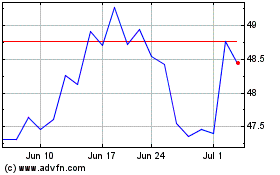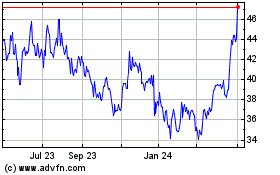By Shan Li
The Trump administration's decision to ban WeChat, the popular
Chinese messaging app, has sent Chinese-Americans scrambling to
find alternative forms of communication with friends and family in
China.
"The bridge between me and my family in China, it will be cut
off," said Ada Lin, a Manhattan-based counselor advocate at the
Chinese-American Planning Council.
WeChat, owned by Chinese tech giant Tencent Holdings Ltd., has
more than 1.2 billion users world-wide. In China, it is known as
the do-everything app where consumers, companies and governments go
to communicate, make payments, do business, and much more.
On Friday, the Trump administration said it would ban the use of
WeChat in the U.S., along with downloads of the Chinese
video-sharing app TikTok, over national security and privacy
concerns. Under rules laid out by the Commerce Department,
U.S.-based individuals will no longer be able to download or update
either app through Google's and Apple Inc.'s app stores after
midnight on Sunday.
While TikTok could still skirt a U.S. ban under a deal being
worked out involving Oracle Corp. and other U.S. companies, WeChat
users will be hit hard. All money transfers through the app for
U.S.-based users will be blocked. The functionality of the app will
further deteriorate with the end of U.S. support for the app
through internet traffic services such as data hosting and content
caching.
In the U.S., WeChat has been downloaded nearly 22 million times
from the Google Play and Apple App store since January 2014,
according to research firm Sensor Tower. That accounts for roughly
7% of the app's total downloads outside China over that period.
Many Chinese-Americans and U.S. businesses with a largely
Chinese clientele say they rely on WeChat as their primary tool for
keeping in touch with people in China and in Chinese communities
throughout the world. Other popular platforms such as Google,
Facebook and WhatsApp are banned in China, and more niche messaging
apps such as Signal aren't widely used.
Ms. Lin said she uses WeChat almost daily. At least twice a
week, the 24-year-old said, she uses it to videochat with her aunt
and cousin in the Chinese city of Fuzhou. Ms. Lin also relies on
the app to communicate with the parents of students who are part of
the after-school program she helps run in Manhattan.
Ms. Lin said she has already discussed substitute tools with her
mother, who also lives in the U.S. and uses WeChat to stay in touch
with her sister in China. But so far, neither has come up with a
viable and cheap solution.
"International calls are really expensive," she said. "We just
can't think of another way."
As for the parents whose children participate in her New York
program, Ms. Lin has already proposed switching to the Japanese
chat app Line, which has a similar feel to WeChat.
"But many of them don't have an account," she said. "Most of
them don't have another app" besides WeChat.
Monty Dunn, an anesthesiologist in San Francisco, said WeChat
has allowed him to stay in touch with friends from his Shanghai
childhood and with people he befriended in the U.S. who have moved
back to China. He said even family members living in San Jose,
Calif., rely on WeChat to stay in contact with him and each
other.
"It's like Facebook," he said. "I use it almost daily."
Losing access to WeChat, he said, will be "a huge
inconvenience." Dr. Dunn predicted that the move could cost
President Trump support among many Chinese-American voters in the
coming November election.
"There are a lot of Asian immigrants who tend to be conservative
and would vote for him," he said. "But this will piss off a lot of
people. It's going to affect everyday life for no reason."
Many small U.S. businesses, especially Asian supermarkets and
restaurants, have come to rely on WeChat as an ordering and
marketing tool over other such services, such as Postmates or
Seamless.
Jina Zhou, manager of Kung Fu Steamer in Brooklyn, said about
60% of the restaurant's business comes through WeChat as bulk
orders from businesses or individual customers. Ms. Zhou said she
had hoped the ban would never be implemented. Despite weeks of
discussions with staff, she has yet to figure out a viable
alternative for the eatery.
"We could try Facebook, but a lot of our customers are Chinese
and don't use Facebook," Ms. Zhou said. "We'll keep using WeChat
until we can't use it anymore."
Other technologically savvy users say they are confident a
workaround can be found.
Charles Lei, a film producer who divides his time between
Beijing and North America, said he plans to update WeChat -- "the
go-to app for maintaining relationships," as he put it -- every
time he travels outside of the U.S. But for other Chinese-Americans
who don't often leave the country, and Chinese students studying in
the U.S., it will be a huge blow and tarnish their ideals that
America is a true champion of freedom, he said.
"Trump is becoming Xi," said Mr. Lei, referring to Chinese
President Xi Jinping. "Trump is doing exactly the same thing the
Chinese are doing" with the internet.
The app isn't only convenient for keeping in touch with family
in the U.S., China and Taiwan, he said, but its breezy
mobile-payment function can be used in stores in big cities such as
Vancouver and San Francisco. That means he will just use credit
cards instead, he said.
If WeChat slows down too much, Mr. Lei said he may consider
giving up his iPhone in favor of one running on the Android
operating system, which has access to other app stores where he
could find WeChat updates.
He said he has been eyeing a high-end phone made by Huawei
Technologies Co., the Chinese tech company that has been mired in
its own controversy with the U.S. government. "This may cause me to
switch," Mr. Lei said.
Write to Shan Li at shan.li@wsj.com
(END) Dow Jones Newswires
September 18, 2020 18:17 ET (22:17 GMT)
Copyright (c) 2020 Dow Jones & Company, Inc.
Tencent (PK) (USOTC:TCEHY)
Historical Stock Chart
From Mar 2024 to Apr 2024

Tencent (PK) (USOTC:TCEHY)
Historical Stock Chart
From Apr 2023 to Apr 2024
